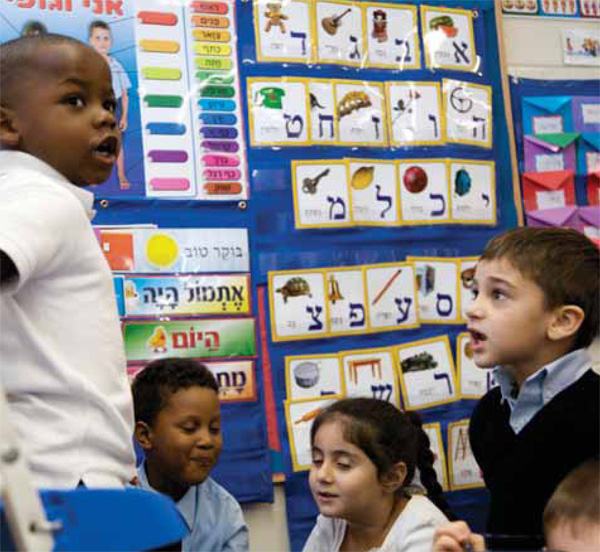
HEBREW
LANGUAGE
CHARTER
SCHOOLS
by SARA BERMAN
F or more than three years, I have been intimately involved with the creation of Hebrew language charter schools. These are public schools that offer an immersive dual-language curriculum for children of all backgrounds. They focus on Modern Israeli Hebrew and culture while emphasizing academic excellence.
My impetus in spearheading this work has been two-fold: Aleph, I love the Hebrew language and want to see it accessible to a much broader range of Americans; Beit, I believe in the value of increasing the options and choices for excellent public education available to all parents and children. So when my family’s involvement with the Areivim Philanthropic Group led me to chair a working group exploring possible projects in the area of formal education, I was excited to try to understand the potential innovations we could generate if we helped open many Hebrew charters across the country.
We started by developing an application for a Hebrew language charter school in Brooklyn, New York and simultaneously began developing a plan and proposal for supporting the development of such schools nationwide. The Hebrew Charter School Center, Areivim’s first project, was born just a few months before the Hebrew Language Academy Charter School in Brooklyn opened its doors. We are moving fast and aggressively, as this is an opportunity that just can’t be missed.
Our schools will teach the Hebrew language in a way that has almost never been done before in American elementary education. Our goal is for our students to eventually be able to speak Hebrew comfortably, and to move beyond the basics of reading and writing. As public schools, Hebrew Charters must teach Hebrew without in any way encouraging the Jewish religion or, for that matter, privileging the particular identity of any one child over that of any other. This is how it should be. By teaching Hebrew in a public context that does not favor any particular identity or religion, the language is made all the more broad, universal, relevant and accessible to Americans at large.
At our schools, Hebrew is not taught in a vacuum. We use the proficiency approach and believe that languages are best learned using the authentic materials of the places in which they are spoken. The teaching of the culture, atmosphere and rhythms of life in the modern secular state of Israel goes part and parcel with teaching Modern Israeli Hebrew. Doing so in public schools also fosters an appreciation for and understanding of Israel that is much more relevant and accessible to Americans.
There are those who question whether it is possible to teach Hebrew in a public school while safeguarding the separation of Church and State. Of course, Hebrew has profound historical connections to religion, but all languages have such connections. Children from all backgrounds learn Greek without having any relationship to Greek Orthodoxy. And the same goes for Latin and Catholicism. Elements of language may have religious origins, but that does not entail their preclusion from use in public contexts if those elements have multiple meanings and uses. For example, the term “Mission Statement” has Christian origins, but it has certainly evolved a clearly secular usage appropriate to a public context. Secular Zionism involved a deliberate and purposeful process of the secularization of the Hebrew language over a long historical period. Using Hebrew terms in a secular way in a public school is appropriate even if those terms might also have religious origins and usage. In addition, there is nothing inappropriate about carefully teaching students in a public school about the religious origins of particular Hebrew terms any more than it would be inappropriate to explain the Biblical allusion of the title of Steinbeck’s Grapes of Wrath in a public-school English class. Charter school authorizers and their legal counsels in four states understand this, as do scores of public school districts across the country that have allowed the teaching of the Hebrew language in their public schools for decades.
I often dream of what the graduates of our Hebrew language charter schools will look like 20 years from now. I see them as a vanguard of understanding for Israel and for cultural respect and sharing in general. I see them as part of a new sense of the portability of the Hebrew language outside of Israel. But the work of the Hebrew language charter school movement will be incomplete if it does not find its complement in a broader movement for bringing Hebrew to America. I look forward to finding partners who are excited to champion Hebrew in new and fresh ways. This beautiful and robust language deserves nothing less. ■
Sara Berman is Chair of both the Hebrew Language Academy Charter School in Brooklyn, New York and the Hebrew Charter School Center.
| PREVIOUS ARTICLE | NEXT ARTICLE |